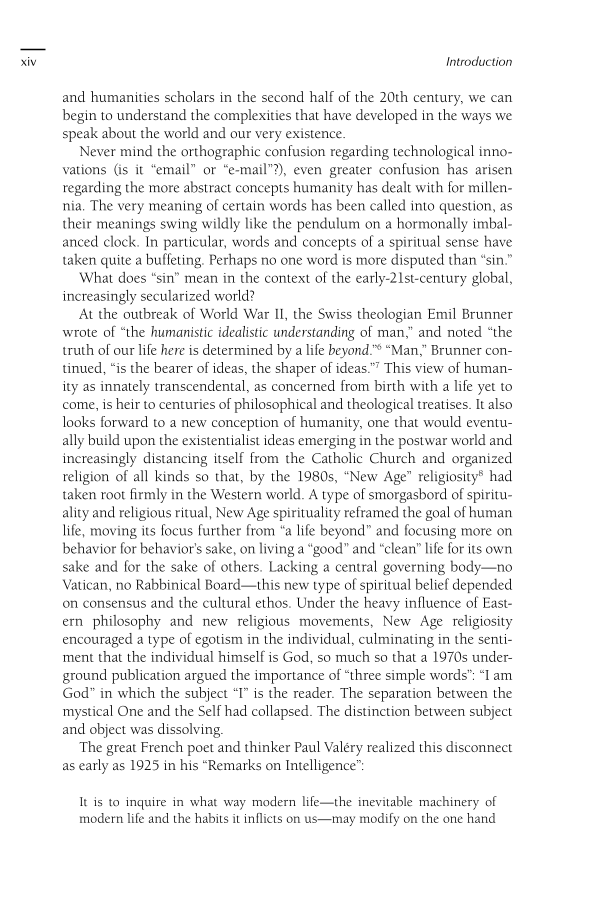xiv Introduction and humanities scholars in the second half of the 20th century, we can begin to understand the complexities that have developed in the ways we speak about the world and our very existence. Never mind the orthographic confusion regarding technological inno- vations (is it “email” or “e-mail”?), even greater confusion has arisen regarding the more abstract concepts humanity has dealt with for millen- nia. The very meaning of certain words has been called into question, as their meanings swing wildly like the pendulum on a hormonally imbal- anced clock. In particular, words and concepts of a spiritual sense have taken quite a buffeting. Perhaps no one word is more disputed than “sin.” What does “sin” mean in the context of the early-21st-century global, increasingly secularized world? At the outbreak of World War II, the Swiss theologian Emil Brunner wrote of “the humanistic idealistic understanding of man,” and noted “the truth of our life here is determined by a life beyond .” 6 “Man,” Brunner con- tinued, “is the bearer of ideas, the shaper of ideas.” 7 This view of human- ity as innately transcendental, as concerned from birth with a life yet to come, is heir to centuries of philosophical and theological treatises. It also looks forward to a new conception of humanity, one that would eventu- ally build upon the existentialist ideas emerging in the postwar world and increasingly distancing itself from the Catholic Church and organized religion of all kinds so that, by the 1980s, “New Age” religiosity 8 had taken root fi rmly in the Western world. A type of smorgasbord of spiritu- ality and religious ritual, New Age spirituality reframed the goal of human life, moving its focus further from “a life beyond” and focusing more on behavior for behavior’s sake, on living a “good” and “clean” life for its own sake and for the sake of others. Lacking a central governing body—no Vatican, no Rabbinical Board—this new type of spiritual belief depended on consensus and the cultural ethos. Under the heavy infl uence of East- ern philosophy and new religious movements, New Age religiosity encouraged a type of egotism in the individual, culminating in the senti- ment that the individual himself is God, so much so that a 1970s under- ground publication argued the importance of “three simple words”: “I am God” in which the subject “I” is the reader. The separation between the mystical One and the Self had collapsed. The distinction between subject and object was dissolving. The great French poet and thinker Paul Valéry realized this disconnect as early as 1925 in his “Remarks on Intelligence”: It is to inquire in what way modern life—the inevitable machinery of modern life and the habits it infl icts on us—may modify on the one hand
Document Details My Account Print multiple pages
Print
You have printed 0 times in the last 24 hours.
Your print count will reset on at .
You may print 0 more time(s) before then.
You may print a maximum of 0 pages at a time.


























































































































































































